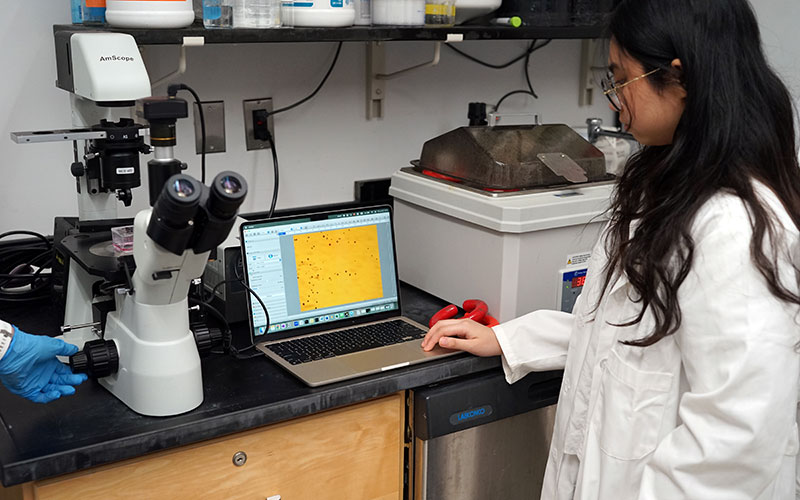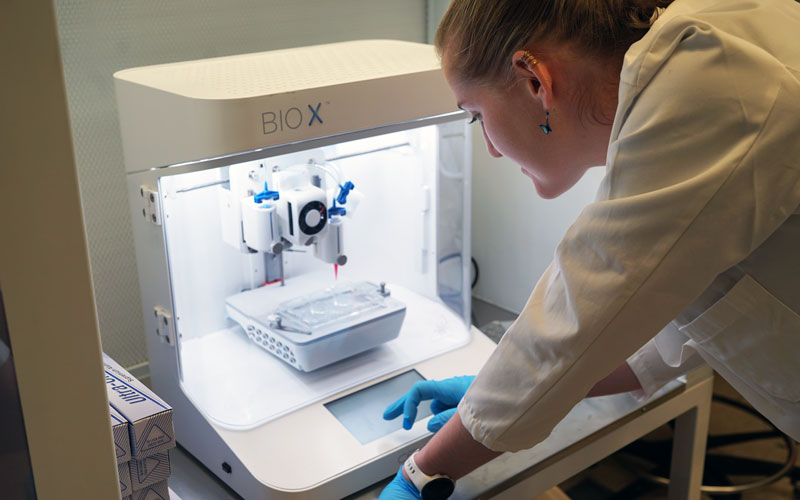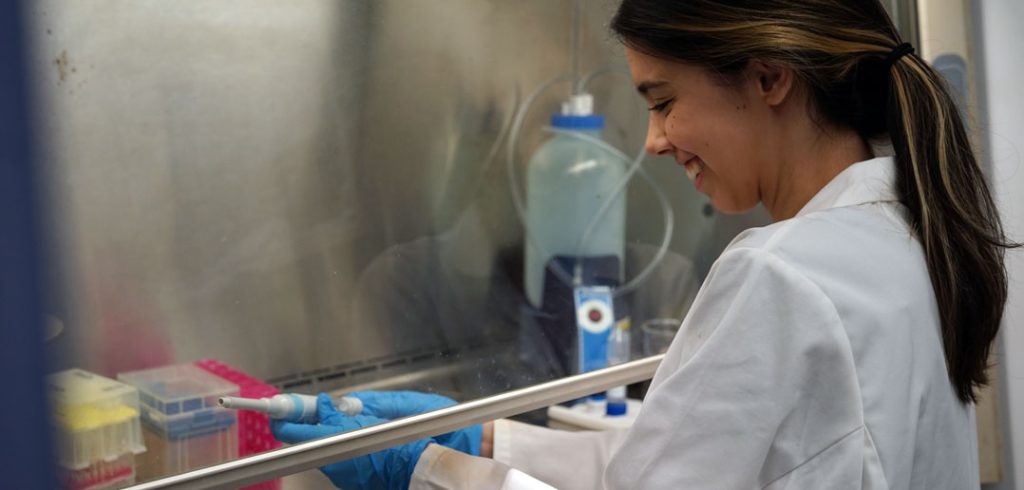With help from recent graduate Beatriz Goncalves, FCRH ’23, and her mentor Professor Ipsita Banerjee, Ph.D., Phan looked into how specific peptides—strings of amino acids—could potentially mitigate an enzyme that contributes to ALS from “misfolding,” or failing to function properly.
The goal of the project was to design new peptide-based drug molecules on a nanoscale level that would limit that misfolding so that it wouldn’t disrupt the other proteins from working properly within and outside the cells, according to Goncalves and Banerjee. Goncalves and Phan showed that the molecules that they developed were able to reduce oxidative stress in cells, and that some of the molecules could mitigate misfolding over time.
“The results have been exciting,” Goncalves said.
Phan and Goncalves were just two of the students who spent the summer conducting research in Banerjee’s lab in John Mulcahy Hall at Rose Hill.
Banerjee, the chair of the chemistry department and program director of Biochemistry, said her students have been working on drug delivery systems, particularly those that target tumors and cancerous cells, and developing new biomaterials for tissue engineering as well as targeting protein misfolding in neurodegenerative diseases.
In the lab, the students have access to a variety of scientific equipment, such as a 3D bioprinter, which allows them to replicate tissue growth and investigate these tissue models for their research.
“My biggest passion at Fordham is working with students in the research lab, and preparing them to become next-generation scientists,” Banerjee said, adding that she mentors students throughout the year, both in the lab and in her classes.

From the Lab to a Ph.D.
For Goncalves, who was a biology major and biochemistry minor, the experience in Banerjee’s lab helped her get accepted into numerous Ph.D. programs. She chose to pursue her Ph.D. at the University of Pennsylvania, going for cell and molecular biology where she will work on immunotherapeutic research for targeting cancer.
“I’m an undergraduate student who had the experience and who has the resume to be able to go straight into a Ph.D. That’s an opportunity that was offered to me at Fordham that I probably would not have had at other schools,” she said. “I would probably have to take a gap year or do something else like a master’s in order to have the resumé I have now.”
Goncalves published at least five research papers with Banerjee at Fordham, including a few where she was the first author on the project. She and Molly Murray, FCRH ’23, who majored in chemistry and psychology, said that they spent 10-12 hour days in the lab in summer 2022 and during the school year working on a variety of projects, such as developing ways to deliver drugs into glioblastoma tumor cells as well as developing new peptide based drug molecules for targeting breast tumor cells. The pair also spent this past summer in the lab wrapping up their research projects.
“Beatriz and I last summer, we probably spent about 80 hours a week here,” Murray said. “There were a lot of times where we were here past midnight, but I feel like we’re both very well prepared for going into Ph.D. [programs] and that kind of time commitment.”
Murray, who was also accepted to several programs and will start a Ph.D. in chemistry at the University of North Carolina next fall, said that before working in Banerjee’s lab she had minimal lab experience.
“I think she definitely challenges us a lot—especially when you’re first coming into the lab, there’s a ton of stuff to learn right off the bat,” she said. “We’re a lab that helps each other out a lot, but there’s also that part of it that you have to investigate by yourself, so having that push is definitely helpful.”

Research on Cancer, Aging, and More
Many students working in the lab over the summer were focusing on drug or treatment delivery systems that could target cancer cells. Murray focused on ovarian cancer, while Amrita Das, a sophomore biology major, started a research project investigating lung cancer.
“I plan on going to med school,” Das said, “so I wanted to get exposed to a research lab setting to get experience.”
Sophomore Aigerim Mukhit’s summer research focused on skin regeneration and aging, particularly around cells called fibroblasts.
The goal of her research was to investigate the impact of peptide conjugates on aged fibroblasts to examine if they enhance can express characteristic proteins, which are indicative of regeneration.
“I just want to contribute to biomedical research—I want to study aging, not only skin aging, but overall aging,” she said.

